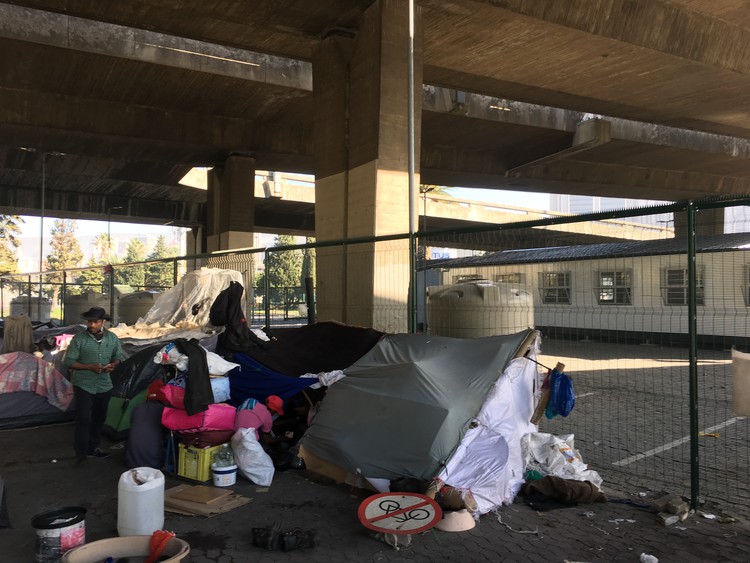Covid-19 vaccinations: homeless people at risk of being left out
At present the system requires an ID to register
People sleeping under the Foreshore bridges in Cape Town. Archive photo: James Stent
Homeless people are at risk of being left behind in the Covid-19 vaccination drive if they do not have identity documents.
“Our registration on the system requires somebody to have an ID number. It is a limiting step at this point in time,” said Dr Keith Cloete, head of the Western Cape health department. “So anybody that is on the street and has an ID number can be registered, but those who do not have an ID number is a challenge. That also goes for those who are undocumented and for migrants and displaced people.”
Cloete told GroundUp the department was talking to the national departments of Health and Home Affairs on how to overcome this challenge.
“Our teams do reach out to anyone who is eligible to register and has the necessary documentation,” he said.
As of 17 June, according to Western Cape Premier Alan Winde, over 229,000 people 60 years and older had been vaccinated.
“From Monday, 21 June, we plan to have a total of 155 active vaccination sites online and can scale-up the number of vaccine sites, should we receive additional vaccines. This number of active sites is slightly fewer than the previous week, but as communicated previously, the number of sites operational is dependent on the vaccine allocation received.”
“Over the first five weeks of the Phase 2 rollout we have managed to bring online a total 205 vaccine sites across the Western Cape.”
“By Friday 11 June, 356,857 residents had registered for Phase 2 of the mass vaccine programme in the Western Cape, which is nearly 50 percent of the total eligible to register,” said Winde in a statement.
But it is not clear how many of these are people living on the streets.
The Haven Night Shelter Welfare Organisation’s CEO Hassan Khan says the organisation has so far registered over 300 people over 60 for vaccinations and will do more registrations. The Haven has 1,198 beds in the Western Cape.
“Once everyone else [under 60] can be vaccinated we will make sure that we do registrations for them as well. I believe that homeless people should be treated like any other persons in South Africa,” said Khan.
Cloete said another challenge was following through with appointments. At the moment, he said, the province was focusing on “low uptake registration areas with socio-economic challenge” and would then move to registration and vaccination for vulnerable people. “This will in all likelihood include street people,” said Cloete.
Winde added: “We are committed to the identification of people that are at risk whether they are homeless people or people in our facilities via our social workers. We add these to our campaigns as we go along.
“Obviously you are at risk if you do not have an ID but we are looking at spaces where people are gathering, as we roll out these campaigns. That’s why we have measurement tools to see where people are, in which region, how many have registered.”
When the system picked up people who were missing, the provincial government would engage with Home Affairs, he said.
Zahid Badroodien, Mayco Member for Community Services and Health, said the City of Cape Town was arranging registration at its Safe Spaces for homeless people.
“Homeless people are able to make use of all library facilities in the city. There are staff to assist them if they require assistance. The City does not assist directly with identity documents. However, partner community organisations support those homeless who access services through our safe spaces,” said Badroodien.
“The Western Cape Government has also opened 75 Cape Access Centres to assist residents with registration,” said Cloete.
Jesse Laitinen, project director of Streetscapes, which is part of Khulisa Social Solutions, offering social services to the homeless, said the organisation was not involved in the current phase of the vaccinations, but once registration was open to those under 60, the project would offer help where possible.
Support independent journalism
Donate using Payfast

Next: Hundreds making use of SASSA’s new online booking portal for disability grants
Previous: Immigrant shop owners plead to be allowed to continue trading in Diepkloof
© 2021 GroundUp. This article is licensed under a Creative Commons Attribution-NoDerivatives 4.0 International License.
You may republish this article, so long as you credit the authors and GroundUp, and do not change the text. Please include a link back to the original article.
We put an invisible pixel in the article so that we can count traffic to republishers. All analytics tools are solely on our servers. We do not give our logs to any third party. Logs are deleted after two weeks. We do not use any IP address identifying information except to count regional traffic. We are solely interested in counting hits, not tracking users. If you republish, please do not delete the invisible pixel.

